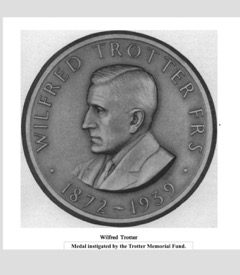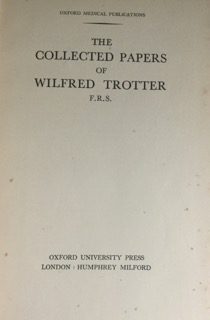JMS Pearce
East Yorks, England
 |
| Fig 1: Wilfred Trotter |
Polymathy was perhaps more frequent in the distant past1 when the strictures imposed by administrative managers were not yet implemented and the undoubted blessings of technology were but a remote dream. For a famous surgeon to embrace sociology is a distinctly unusual manifestation of polymathy. The two faculties, like oil and water, at first sight do not seem to mix; yet, both were enhanced by the now largely forgotten Wilfred Batten Lewis Trotter (1872-1939) (Fig 1.).
Wilfred Trotter was born on November 3, 1872 at Coleford, Gloucestershire, the third son of a merchant and his wife.2 His childhood was hampered by spinal tuberculosis. His sparse early education was mainly at home but later at Bell’s Grammar School, Coleford. He recovered, but was later described as “frail-looking, stooping somewhat, and prematurely old”. His family moved to London where he attended University College Hospital (UCH), qualifying MB with first-class honors in 1896 and MD in 1897. He passed the FRCS examination in 1899, and MS in 1901.
He was greatly influenced by a dazzling array of UCH teachers including Victor Horsley; the technically accomplished surgeon Arthur Barker; Charlton Bastian, FRS; Sir Thomas Barlow, FRS; and Sir John Rose Bradford, FRS. A surgical registrar at UCH from 1901-4, on Horsley’s retirement in 1906 he was appointed Assistant Surgeon, and eventually full Consultant in 1915. Meanwhile the ambitious surgeon-in-embryo, at University College refined his knowledge of anatomy, which was to be a major tool in his later surgical mastery. Trotter and the surgeon Hugh Morriston Davies performed experiments on themselves in order to investigate the regeneration of sectioned sensory peripheral nerves.3 Their investigation followed the example set by Henry Head and W. H. R. Rivers who believed that
there were two types of sensation: protopathic (coarse senses of temperature and pain)) and epicritic (fine discrimination of shape, size and localization). Trotter and Davies did not accept Head’s theory of this duality. They believed that the regenerated nerve must be looked on as pathological, not a pure regrowth of the original; and they attributed cutaneous hypersensitivity to lack of insulation from other tissues; i.e. neurilemma.
Quite remarkably for a surgeon, Trotter interested himself in and made major contributions to social psychology, principally concerning “the herd instinct”.3 His papers in the Sociological Review in 1908 and 1909 were entitled “Herd Instinct and Its Bearing on the Psychology of Civilised Man” and “Sociological Application of the Psychology of Herd Instinct”. He showed that the conditions of life of “gregarious” animals gave rise to an instinct of such power that its workings could be followed through the emotions and even the intellectual processes behind man’s social behavior. The distinguished London surgeon had become what he designated, a “biological psychologist” of influence. Some controversially said his claim to fame did not rest principally on his distinction as a surgeon because he became known to the world outside of medicine by his 1916 book Instincts of the Herd in Peace and War.4 This was influential with both social scientists and the general public. The herd instinct caused animals to congregate and determined their behavior with their own kind; the nature of this herd instinct was shown by studying the gregarious animals, including man, whose behavior could be predicted and controlled by means of this knowledge. There were three types of gregariousness: the beehive, the sheep flock, and the wolf pack. Doubtless to enhance morale in the First World War he compared England to the beehive and Germany to the wolf pack. He believed that: “the great advantage of the social habit is to enable large numbers to act as one”; and, “The only medium in which man’s mind can function satisfactorily is the herd, which therefore is not only the source of his credulities, his disbeliefs, and his weaknesses, but of his altruism, his charity, his enthusiasms, and his powers.”
 |
| Fig 2: The collected papers of Wilfred Trotter |
This book was a breakthrough in the understanding of group behavior, long before it was applied to several fields of commerce. He was one of the first to stress the need for providing a scientific basis for the understanding of social facts. Much later he rejected the inevitability of war and regarded pacifism as a natural development — an unusually, provocative statement for his time.
He also became interested in Josef Breuer and Sigmund Freud’s Studies on Hysteria, and introduced his ideas to Ernest Jones, the doyen of English Freudian psychoanalysis, whose sister Elizabeth May Jones he married in 1910. They had one son, Wilfred Robert Trotter, who became consultant physician and thyroidologist at University College Hospital. Although Wilfred Trotter was Ernest Jones’s closest friend, Trotter was critical of Freud for ignoring certain aspects of psychology, and postulated, in addition to Freud’s instincts for self-preservation, feeding and sex, the social phenomenon that Trotter called gregariousness.
When eventually appointed to UCH, Wilfred Trotter became one of the greatest surgeons of the time. His surgery was founded on scrupulous technique (“No gentler hands were ever given to a surgeon.”) and a comprehensive knowledge of anatomy that he successfully applied using his own techniques to operations for head and neck cancer. He inherited much of Victor Horsley’s neurosurgery at UCH and pioneered the investigations of head injuries, subdural haematoma, and aneurysms. He also made contributions to surgery of thyrotoxicosis. In short, he was much in demand in every branch of surgery, not only for his skill and judgement in treatment but also for his legendary diagnostic acumen. Such was his reputation that he was called to attend King George V who had empyema of the lung. Trotter is said to have traveled by bus to Buckingham Palace to operate on him. He dramatically saved the King’s life by excision and drainage. A man of the people, he subsequently refused a knighthood. However, he held the office of “sergeant surgeon” to both King George V (1928 to 1932) and George VI.
In 1931 he relinquished private practice to devote himself, unpaid, to the training of young surgeons at UCH. He was made Professor of Surgery in 1935 and was appointed director of the surgical unit between 1935 and 1938. He was elected Fellow of the Royal Society (supported by Thomas Lewis, CS Sherrington et al.) on May 7, 1931, and served on its council. He served the councils of the MRC, and the Royal College of Surgeons where he was successively Hunterian professor and Hunterian orator. His elegantly written “The Collected Papers of Wilfred Trotter”6(Fig 2.) shows his wider interests and views on the philosophy of medicine and surgery. Four of the 12 chapters are devoted to neurological disorders. Trotter published 71 papers. A bibliography resides in the RCS library and was published with modifications in the Royal Society’s obituary notice.7 There is little biographical material on Trotter; the main sources used here are the papers of R.S. Pilcher8, I.B. Rosen9, Julian Taylor10, and Douglas Holdstock11.
Throughout his life he was plagued by kidney stones and urinary infection, which eventually caused his death. His frail health makes his achievements the more remarkable. Trotter’s intellectual and analytical method was likened to that of Socrates:
“a conversation, never with discourtesy or overbearing force, compel those sharing it to think afresh, to see through time-worn phrases, and to discover the foundations of their beliefs.”12
His colleagues regarded him as an enigma. Although in everyone he inspired respect and in many affectionate hero-worship, and although his company and conversation were sometimes a delight, he was reserved and, shunned all personal sentiments in talk; nor was he readily intimate in friendship. Yet amongst students and colleagues he was regarded with well-earned adulation which recognized his kindness and humanity, particularly to his patients. Professor Robin Pilcher, said of him:
“The memory of Wilfred Trotter that I cherish is simply this—the perfect example of a good doctor”.
He died at home in Blackmoor, Selborne, Hampshire, on November 25, 1939.
Captions
Fig 1. Wilfred Trotter. From small silver relief by Mr.Paget, reproduced by Taylor J. in Presidential Address given at the Meeting of the Surgical Section of the Royal Society of Medicine. Ann R Coll Surg Engl. 1949; Mar; 4(3): 144–159.
Fig 2. The collected papers of Wilfred Trotter. From photograph of author’s (JMSP) copy.
References
- Pearce JMS. Polymathy in Decline? Hektoen Int. Volume 5, Issue 4 – October 2013
- Plarr’s Lives of the Fellows Online. Trotter, Wilfred Batten Lewis (1872 – 1939) http://livesonline.rcseng.ac.uk/biogs/E004722b.htm
- Malt RA. , Doctors afield: Wilfred Trotter’. New England Journal of Medicine 1957; 257:933-5
- Trotter W. Instincts of the herd in peace and war. London, Unwin; New York, Macmillan. 1916,. 2nd edition, 1919; new edition, Oxford University Press, 1953.
- Trotter W. Sociological application of the psychology of herd instinct. Sociological Review, 2, 1909, 36.
- Trotter W. The collected papers of Wilfred Trotter. Oxford University Press: 1941
- Elliott TR. Royal Society of London, Obituary Notices of Fellows, 1941, 3, 325-344
- Pilcher RS. ‘Wilfred Trotter, FRS, FRCS’. Annals of Royal College of Surgeons, 1973;53:71-83.
- Rosen IB. Wilfred Trotter: surgeon, philosopher. Canadian Journal of Surgery. 2006;49(4):278-280.
- Taylor J. Presidential Address given at the Meeting of the Surgical Section of the Royal Society of Medicine on Nov. 3, 1948. Ann R Coll Surg Engl. 1949; Mar; 4(3): 144–159.
- Holdstock D. ‘Trotter, Wilfred Batten Lewis (1872–1939)’, Oxford Dictionary of National Biography, Oxford University Press, 2004; online edn, Oct 2006 [http://www.oxforddnb.com/view/article/36562, accessed 20 Feb 2016]
- Elliott TR. Mr. Wilfred Trotter, F.R.S. Nature 1940;145:59-60
JMS PEARCE is a retired neurologist and author with a particular interest in the history of science and medicine.

Leave a Reply